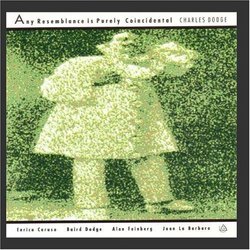Breaking no new grounds, not particularly interesting, and u
Discophage | France | 10/05/2007
(2 out of 5 stars)
"I discovered the music of Charles Dodge through two of his Four Etudes for Violin and Tape (1994), featured in a collection of Violin and Piano works played by Miwako Abe and Michael Kieran Harvey on a New World Records CD (Works for Violin by George Antheil; Johanna Beyer; Henry Cowell; Ruth P. Crawford; Charles Dodge; David Mahler, Larry Polansky, Stefan Wolpe). I enjoyed them very much, which prompted me to want to explore more. In view thereof, I am sorry to find myself disappointed with the present disc.
First, I find its musical rewards to be limited. "Any Resemblance is Purely Coincidental" is an "etude" on Caruso's 1907 recording of Pagliacci's "Vesti la giubba" aria. The voice is computer-altered and a piano part is added. One of the problem lies in the fact that the piano often just takes the place of the orchestra, playing, as it were, the vocal score. So what? Dodge apparently is trying to comment upon the disappearance of a Romantic, 19th Century style of singing and the birth of the modern age of mechanical reproduction of sound. The altered voice is often "ghostly", which can be interestingly unsettling, but still I can imagine many more imaginative ways to express that message, even on the basis of that very Caruso recording.
Likewise, Speech Songs (1972) is a pointillistic computer-alteration of a speaker's voice uttering lines of non-sensical poetry of Mark Strand. But after a minute everything is said and nothing very original happens thereafter. It is interesting as an "etude" in voice alterations, but its purely musical content, and hence the pleasure derived from it, is limited.
The Waves, on a text of Virginia Woolf, elicits more fascination, thanks to the voice and haunting melismatas of Joan La Barbara. It is slow-moving and undramatic, but quite atmospheric. But the tape "accompaniment" breaks no grounds, it is oftentimes cliched of tape music: high-pitched "windy" sounds and "ricochet" punctuations (I am using here the bowing technique term). I am not crazy of Robert Ashley, but at least his use of voice and synthesizer, even if it is not as sophisticated as Dodge's, is integrated in a theatrical approach that can yield a more lasting fascination effect. The same is true with Viola Elegy in the memory of Morton Feldman: a long viola lament over a dreamy "carpet" of tape sounds (evoking the resonances of bells) that fills in the acoustical space but serves little other purpose, being not particularly interesting or inventive in itself. It dies away after 13 minutes - and one hardly notices.
Then, there is less than 45 minutes of music on the disc, which is unacceptably too short. Granted, what there is doesn't seem to warrant more, but still, New Albion could have fitted 30 more minutes, and who knows? there could have been something of greater value therein, if only the complete Violin and Tape Studies. Many CDs enter my collection and, thanks to available shelf-space, very few exit. This one goes. I find it of no particular interest.
"


 Track Listings (7) - Disc #1
Track Listings (7) - Disc #1